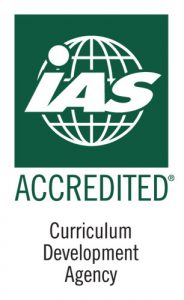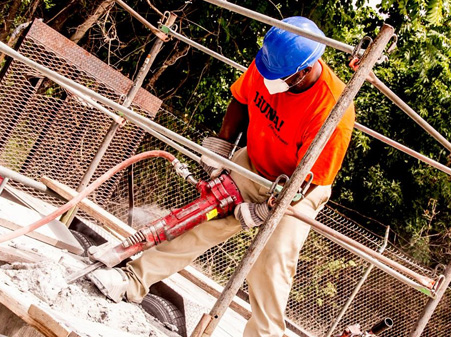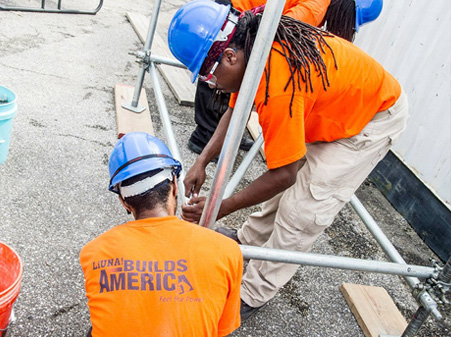Classes
Questions and How to Apply
Email: dctraining@bwltf.org
 Our curriculum provided to us by LiUNA Training is third party accredited through International Accreditation Services (IAS). The course material that is used was developed through the rigorous process of convening subject matter experts (SME), skill standards developed by a third party and then based on the skill standards the curriculum was developed with input from SME’s and various other stakeholders. Course Material is developed based on the best practices of adult education and are active based lesson plans. Active based lesson plans take the focus away from the instructor driven course work and creates an atmosphere where the participants are the primary focus and they are actively involved throughout the course. (link here to register for courses)
Our curriculum provided to us by LiUNA Training is third party accredited through International Accreditation Services (IAS). The course material that is used was developed through the rigorous process of convening subject matter experts (SME), skill standards developed by a third party and then based on the skill standards the curriculum was developed with input from SME’s and various other stakeholders. Course Material is developed based on the best practices of adult education and are active based lesson plans. Active based lesson plans take the focus away from the instructor driven course work and creates an atmosphere where the participants are the primary focus and they are actively involved throughout the course. (link here to register for courses)
CONCRETE
The Concrete program prepares CCLs to work safely and productively in this potentially hazardous field. Safety issues associated with the mixing, forming, placement, and curing of concrete materials as well as the associated skills are covered in depth. Through instructor facilitated and extensive hands-on training, the CCL becomes familiar with construction math and measurements, project planning, and site preparation. Other topics important to a concrete worker, such as forming, placing, finishing, and sawing are covered in detail. Appropriate cleanup procedures and concrete repair are also covered in the program.
 GENERAL CONSTRUCTION
GENERAL CONSTRUCTION
The General Construction program introduces participants to a wide variety of concepts, tools, and skills that are important to successfully begin a career as a Construction Craft Laborer (CCL). Participants receive instruction on the work and role of a CCL, commonly encountered safety issues, measurement in construction, safe hand and power tool operation, and materials frequently used in construction. Each topic is presented in a separate module, several of which require students to perform tasks or demonstrate skills being taught. Special emphasis is placed on following proper procedures and developing safe work habits.
HOISTING AND RIGGING
The Hoisting and Rigging program is designed to educate CCLs in the rules, processes, and procedures to safely rig, signal, and hoist loads on construction projects. The program incorporates federal and state regulatory requirements as well as equipment manufacturers’ standards. Knowledge of the regulations, as well as an in-depth understanding of equipment, work procedures, techniques, and safety considerations is essential for CCLs to function in a zero-accident environment. The program combines classroom instruction with hands-on exercises to ensure competency.
LINE AND GRADE
The Line and Grade program focuses on the skills, knowledge, and aptitude necessary to operate a variety of surveying instruments and record information for maintaining elevation and alignment control points on heavy and civil construction projects.
MASON TENDING
The Mason Tending program provides instruction on the mason tender’s duties, proper job task performance, and details health and safety issues associated with mason tending. Participants use mathematical and scientific concepts to achieve an understanding of working with masonry units, mortars, and admixtures. In addition, the fundamentals of cutting and cleaning masonry, tending plasterers, and operating a rough terrain forklift are also covered. The program emphasizes the need for executing each job task safely and correctly. Knowledge of basic construction math is required for participants in this program.
PERMIT REQUIRED CONFINED SPACE
The Permit Required Confined Space program focuses on the identification of the different types of confined spaces as well as their associated hazards. Participants receive detailed instruction on rules, regulations, and procedures to be followed when entering a confined space as well as methods to mitigate the associated hazards.
PIPELAYING
The Pipelaying program prepares CCLs to safely install pipe systems by introducing participants to the tools, equipment, and techniques typically used in pipelaying. Special attention is paid to the proper work practices as well as protective measures to be followed to install a variety of piping systems safely.
PIPELINE
The Pipeline program instructs CCLs on the safe practices and procedures during pipeline construction projects. All phases of pipeline construction are covered including the front-end work, pipe handling, pipe coating, and back-end work.
 SCAFFOLD
SCAFFOLD
The Scaffold program is designed to address the needs of CCLs that are responsible for building scaffolding on the job site or are required to perform job tasks while using scaffolding. Designed to meet the training requirements of 29 CFR Part 1926.454, the comprehensive program also includes use of a specialized pre-built scaffold system. The program also includes participant discussion, interactive exercises, and extensive hands-on training.
ATSSA Flagger – Approved Flagger course for Maryland
ASBESTOS ABATEMENT WORKER
The Asbestos Abatement Worker program prepares CCLs to work safely and productively on asbestos abatement projects. The program is designed to exceed Occupational Safety and Health Administration (OSHA) and Environmental Protection Agency (EPA) training requirements under 29 CFR Part 1926.1101 and 40 CFR Part 763 respectively. Participants receive extensive instruction and hands-on training on work area preparation, decontamination facility construction and use, abatement techniques, and cleanup procedures. Special emphasis is placed on following proper procedures and developing safe work habits.
ASBESTOS ABATEMENT WORKER REFRESHER
The Asbestos Abatement Worker Refresher program reviews critical topics associated with asbestos abatement activities. Up-to-date information regarding new regulations, equipment, work practices and procedures, and other related information is detailed.
HAZARDOUS WASTE WORKER
The Hazardous Waste Worker program prepares CCLs to work safely and productively on hazardous waste remediation projects. The program meets all Occupational Safety and Health Administration (OSHA) training requirements under 29 CFR Part 1910.120 – Hazardous Waste Operations and Emergency Response. Training is mandatory for all workers conducting hazardous waste remediation activities on all Environmental Protection Agency (EPA) National Priorities Listed (NPL) hazardous waste sites as well as all state, local, county, city, public, and private hazardous waste sites.
HAZARDOUS WASTE WORKER REFRESHER
The Hazardous Waste Worker Refresher program recertifies CCLs to conduct remediation activities on hazardous waste projects. Required annually, the program meets all Occupational Safety and Health Administration (OSHA) training requirements under 29 CFR Part 1910.120 – Hazardous Waste Operations and Emergency Response. Participants receive instruction regarding new or revised regulations, remediation technologies, and advancements in remediation processes.
MICROBIAL REMEDIATION
The Microbial Remediation program instructs CCLs on the health hazards, personal protective equipment requirements, and remediation processes and techniques associated with the removal of mold as well as other microbial contamination
SILICA AWARENESS
The Silica Awareness program provides information to CCLs regarding the hazards associated with work activities such as concrete sawing or stone cutting of materials, which contain silica.
CRAFT ORIENTATION
The Craft Orientation program introduces participants to the construction industry and prepares those seeking a career as a Construction Craft Laborer (CCL). Emphases is placed on developing good work habits, being productive on the job, working under a collective bargaining agreement, being aware of growth areas in construction employment, and background information on the Laborers’ International Union of North America and its related funds.
HAZARD COMMUNICATION
The Hazard Communication program introduces CCLs to the Occupational Safety and Health (OSHA) Hazard Communication Standard, as it applies to the construction industry. Training focuses on the guidelines for recognizing and protecting oneself from exposure to hazardous substances, including identifying chemical hazards and the proper use of container labels, placards, and material safety data sheets.
OSHA CONSTRUCTION SAFETY AND HEALTH
The OSHA Construction Safety and Health program is designed to meet the requirements for OSHA’s 10-hour and 30-hour training programs. The program provides safety and health information as it relates to the many hazards found on construction projects and offers insight into their mitigation.
RESPIRATORY PROTECTION
The Respiratory Protection program details the correct use of respirators when there may be hazardous substances present. Focus is placed on using exposure guides, respirator selection, proper use of respirators, and respiratory protection program requirements.
ASBESTOS ABATEMENT SUPERVISOR
The Asbestos Abatement Supervisor program builds on the Asbestos Abatement Worker program and prepares CCLs to supervise asbestos abatement projects. The program exceeds Occupational Safety and Health Administration (OSHA) and Environmental Protection Agency (EPA) training requirements. Participants receive extensive instruction and hands-on training on work area preparation, decontamination facility construction and use, abatement techniques, and cleanup procedures. Special emphasis is placed on following proper procedures and developing safe work habits.
ASBESTOS ABATEMENT SUPERVISOR REFRESHER
The Asbestos Abatement Supervisor Refresher program reviews critical topics associated with asbestos abatement activities. Up-to-date information regarding new regulations, equipment, work practices and procedures, and other related information is detailed.
LEAD ABATEMENT WORKER
The Lead Abatement Worker program prepares CCLs to work safely and productively on lead abatement projects. The course meets all Occupational Safety and Health Administration (OSHA) and Environmental Protection Agency (EPA) training requirements under 29 CFR Part 1926.62 and 40 CFR Part 745.225 respectively. The course is mandatory for all workers conducting lead-based paint activities in target housing and child occupied facilities.
LEAD ABATEMENT WORKER REFRESHER
The Lead Abatement Worker program reviews critical topics associated with lead abatement activities. Up-to-date information regarding new regulations, equipment, work practices and procedures, and other related information is detailed.
If you need a course that you do not see listed, have questions about any of the courses or need a modified course contact the Training Center.
Courses coming soon: ICRA Best Practices for Hospital Work, Blue print reading

